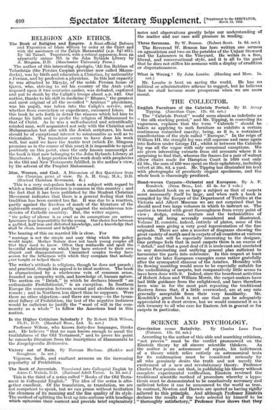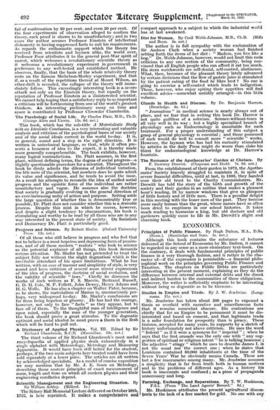SCIENCE AND PSYCHOLOGY.
Gravitation versus Relativity. By Charles Lane Poor (Putnam. 128. 6d. net.) According to the author of this able and searching criticism, ":not proven" must be the verdict pronounced on the Einstein theory by all sincere scientific thinkers. As the author is an astronomer of repute, his indictment of a theory which relics entirely on astronomical tests for its confirmation must be considered seriously by . all who genuinely desire the truth and not merely the excitement of a new and revolutionary theory. Professor Charles Poor points out that, in _publishing his theory without complete experimental verification, Einstein reversed the -traditional scientific method of procedure whereby a hypo- thesis must be demonstrated to be conclusively necessary and sufficient before it can be announced to the world as true. In contrast, Newton and Darwin are quoted as having rigidly' adhered to this principle. And although Professor Einstein declares the results of the tests selected by himself to be' " thoroughly satisfactory," Professor Poor shows that they fail of confirmation by 20 per cent. and even .50 per cent. Of the four experiments of observation alleged to confirm the theory, each proof is shown to be unsatisfactory ; and in two cases the author accuses Professor Einstein of intellectual dishonesty in having suppressed facts to suit his requirements. As regards the enthusiastic support which the theory . has received from scientists and laymen alike, the world over, Professor Poor attributes it to the general post-War spirit of unrest, which welcomes a revolutionary scientific theory as it welcomes a revolutionary .experiment in government in preference to any well-tested and established method. He observes, finally, that the basis of the whole relativity theory rests on the famous Michelson-Morley experiment, and that if, as a result of the repetitions thereof at Mount Wilson, an ether-drift is revealed, the collapse of the theory will imme- diately follow. This exceedingly interesting book is a severe attack not only on the Einstein theory, but equally on the reputation of Professor Einstein as a disinterested scientist. We cannot help hoping that a satisfactory reply to so important a criticism will be forthcoming from one of the world's greatest thinkers. An interesting preliminary essay on time and space is contributed by Professor Chrowder Chamberlin. The Psychology of Social Life. By Charles Platt, M.D., Ph.D.



































































 Previous page
Previous page